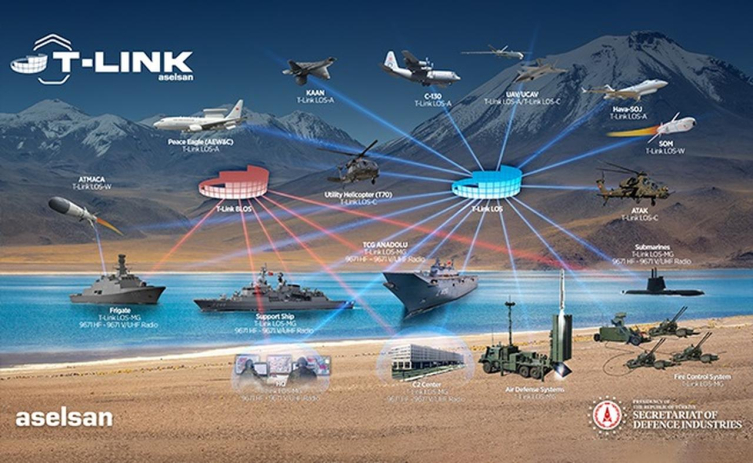Turkey is taking a decisive step toward full independence in military communications with the unveiling of T-Link, a secure, nationally developed data link system by defense giant ASELSAN. The technology will enable real-time, encrypted communication between the Turkish Armed Forces’ air, land, sea, space, and cyber elements—without reliance on NATO or any foreign infrastructure.
The International Defence Industry Fair (IDEF 2025) in Istanbul showcased a range of high-profile military platforms, from fighter jets to missiles and UAVs. Yet, one of the most strategically significant developments went largely under the radar: ASELSAN’s T-Link, a system poised to transform Turkey’s command-and-control capabilities.
A Secure, National Alternative to Link-16
In modern warfare, the ability to connect different platforms seamlessly—and allow decision-makers to command assets across domains—is essential. Traditionally, NATO members, including Turkey, have used Link-16, a widely adopted secure data link. However, Link-16 is a shared network, meaning allied nations can potentially access certain information.
T-Link offers Turkey a fully sovereign alternative. Defense industry researcher Ahmet Alemdar explains:
“T-Link is not designed to replace Link-16 but to complement it as a strategic, national asset. The difference is less about technical specifications and more about operational and strategic control. With T-Link, Turkey’s encrypted communications and operational data will remain fully under national authority, resistant to electronic warfare threats.”
A Game-Changer in Network-Centric Warfare

T-Link is not a single device but a family of integrated systems. Alemdar illustrates its potential with a naval warfare scenario:
A Turkish warship operating in the Blue Homeland detects an enemy vessel. Without revealing its position, it transmits targeting data via T-Link to a UAV such as KIZILELMA or ANKA-3. The UAV launches a missile, which the ship’s commander can control until impact—even changing the target mid-flight.
This level of network-centric warfare—linking ships, aircraft, and unmanned systems in real time—is now achievable entirely through a nationally controlled communication network.
Unlocking Export Potential
Beyond its battlefield advantages, T-Link has significant implications for Turkey’s defense exports. Many advanced platforms rely on foreign-made communication systems like Link-16, requiring export approval from the producing nation.
“One of the biggest obstacles in selling Turkish platforms abroad was the need for third-party export licenses for foreign components,” says Alemdar. “If a system used U.S.-made Link-16, Washington’s approval was mandatory. T-Link removes that requirement entirely.”
This autonomy not only strengthens Turkey’s operational security but also offers international buyers a complete, sovereign communication solution—greatly enhancing export appeal.
Strategic and Economic Impact
By deploying T-Link, Turkey is positioning itself among the few nations capable of producing an indigenous military data link system. The benefits are twofold:
- Strategic: Full control over secure communications in multi-domain operations, independent from NATO infrastructure.
- Economic: A new high-value product for the global defense market, free from foreign export restrictions.
As Alemdar concludes, “T-Link will elevate Turkey’s capabilities on the battlefield while giving Ankara a golden card in the international defense trade.”
With T-Link’s introduction, Turkey is signaling a future where its armed forces and defense industry operate with greater autonomy, resilience, and global influence.







